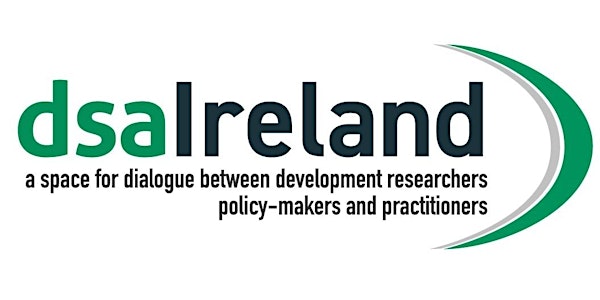
DSAI Annual Conference 2024
Development Studies Ireland Association (DSAI) Annual Conference 2024. Theme: Achieving Just Food Systems in an Era of Global 'Polycrisis'
Date and time
Location
Nano Nagle Place
Douglas Street T12 X70A Cork IrelandRefund Policy
About this event
- Event lasts 1 day 3 hours
Conference Theme
ACHEIVING JUST FOOD SYSTEMS IN AN ERA OF GLOBAL 'POLYCRISIS'
CONFIRMED KEYNOTE SPEAKERS:
Mr. Tom Arnold currently serves as Chair, Ireland Africa Rural Development Committee (IARDC); board member of the Global FoodBanking Network (GFN); member, Global Panel for Agriculture and Food Systems for Nutrition (GLOPAN); board member, Global Alliance for Improved Nutrition (GAIN); member, Malabo Montpellier Panel; board member, Sight and Life Foundation; board member, John and Pat Hume Foundation; board member, Glencree Centre for Peace and Reconciliation. His previous roles include serving as Ireland’s Special Envoy for Food Systems (2021-22); Chair, Food Vision 2030 Strategy Committee (2021); for the EU Commission, he chaired the High-level Expert Group for Food Systems Science (2021) and the Task Force Rural Africa (2019); Coordinator, Scaling Up Nutrition (SUN) Movement; Director-General, Institute of International and European Affairs (IIEA); Chair, Irish Constitutional Convention; CEO, Concern Worldwide; Chief Economist and Assistant Secretary General, Irish Department of Agriculture, Food and the Marine (DAFM); Chair, OECD Committee of of Agriculture; Administrator, EU Commission. Tom has a degree in agricultural economics from University College Dublin (UCD) and master’s degrees from the Catholic University of Leuven and Trinity College, Dublin.
Dr. Helena Pérez Niño Assistant Professor, ISS Erasmus University Rotterdam, conducts research on the political economy of development with special emphasis on the social organisation of production in agriculture and the social impact of globalised agricultural markets. Past research has traced the agrarian reconstruction of the war-ravaged Mozambique-Malawi borderland and state and private-led ideas of post conflict agrarian restructuring (namely, the expansion of contract farming). Her current research examines how agricultural intensification impacts gender power relations and the drivers of underwhelming or frustrated trajectories of productive upgrade. Dr. Nino has worked for UNICEF and UNHCR; has been a visiting fellow at IESE (Maputo) and PLAAS (Cape Town) and her research has been supported by grants from ESRC (UK), the British Academy and the LIDC (UK). Prior to joining the ISS she was a lecturer at SOAS University of London and at the Centre of Development Studies at the University of Cambridge. She serves on the editorial board of the Journal of Agrarian Change and is a co-founder of the Contract Farming Initiative research network (www.contractfarminginitiative.org).
Theme: Food is central to all life on the planet, and yet, access to food has never been more contested. Globally, food systems are under pressure now more than ever, and complex challenges arise with great frequency at the intersects between food, climate, and conflict(i). Climate change is affecting some communities’ ability to achieve the same crop yields as previously, and droughts, flood, or soil degradation means that in some places, harvests are lost temporarily, or lands are becoming permanently unsuitable for farming(ii).
Increasingly, people’s ability to grow food has been significantly impacted by agribusiness, which dominates seed and fertiliser production and the purchase and processing of crops(iii). In places, this has led to conflict over land and or resulted in a reduction of farmers’ access to sustainable means to grow crops(iv).
Finally, ever larger numbers of countries are currently experiencing conflict, which has led to mass displacement, loss of access to land and increasingly to hunger among the displaced. The ability of communities to adapt to these challenges, as well as the opportunities for local, national and international actors to deliver humanitarian aid where needed, is becoming more difficult and unpredictable. In January 2023, the UN stated that the world was then witnessing more conflicts than ever, since it started tracking conflicts after WWII(v). New conflicts have erupted since, with devastating impacts, notably, the conflict in Gaza. In March 2024, estimates suggest that without immediate ceasefire and granting full access to humanitarian agencies, parts of Gaza will be experiencing ‘full blown famine’(vi), caused by relief goods being held up at the border and not reaching civilians in need. This is happening five years after the landmark UN Security Council Resolution 2417 on the Protection of Civilians in Armed Conflict, which explicitly references the use of starvation as a weapon of war(vii).
So far in 2024, the world has already experienced devastating floods in Brazil and Afghanistan and fires in Canada and below-average rainfall in southern Africa. The EAT-Lancet Commission two reports on Report on Food, Planet, Health were published in 2019 and 2023. According to the latest update on the Planetary Boundaries, Earth is now “well outside of the safe operating space” for humanity, having already transgressed six of the nine Planetary Boundaries(viii). Women and children are 14 times more likely to die from climate disasters than men and 80% of those displaced are women(ix).
Mitigating the worst effects of climate change can only be achieved by a transition to sustainable food systems and planetary health that continue to be hindered by global financial injustice. A report by ActionAid has highlighted that fossil fuels and industrial agriculture are the two biggest drivers of the climate crisis(x). As the crisis escalates, these industries continue to expand and thrive. This compounds poverty and inequality and undermines attempts to alleviate poverty. The root causes of the global food system, conflict and climate change and their inter-connection needs to be honestly analysed, in order to find sustainable solutions. This year’s DSAI conference aims to tackle head on the root causes of this polycrisis and re-think models for cooperation that are rooted in human rights and environmental protection.
* If buying a student ticket please use a university student email**
Organised by
The mission of DSA Ireland is to provide a national platform, which provides an open and participatory space for dialogue between researchers, policy-makers and practitioners, who have an interest in, or are working in the area of international development.